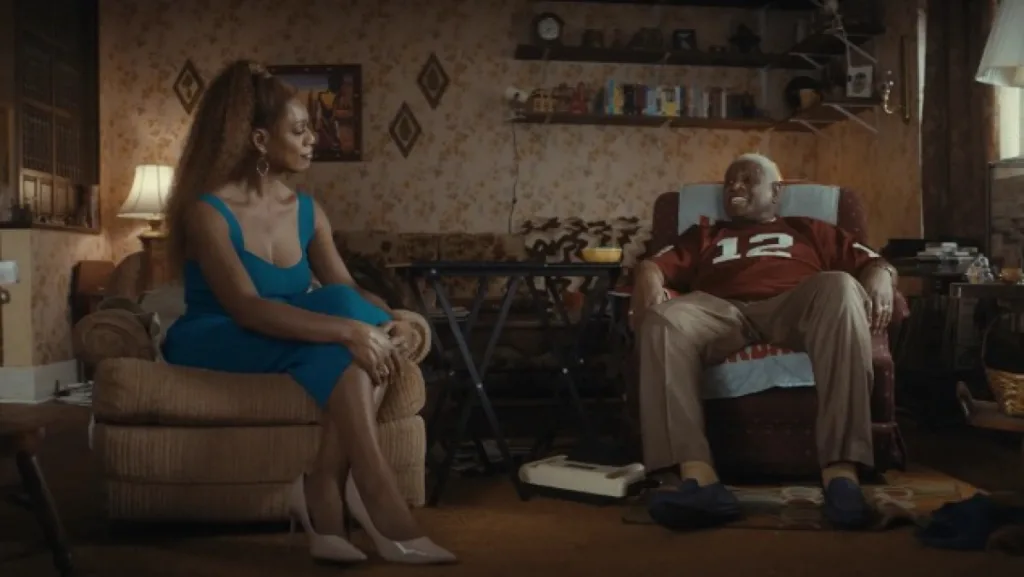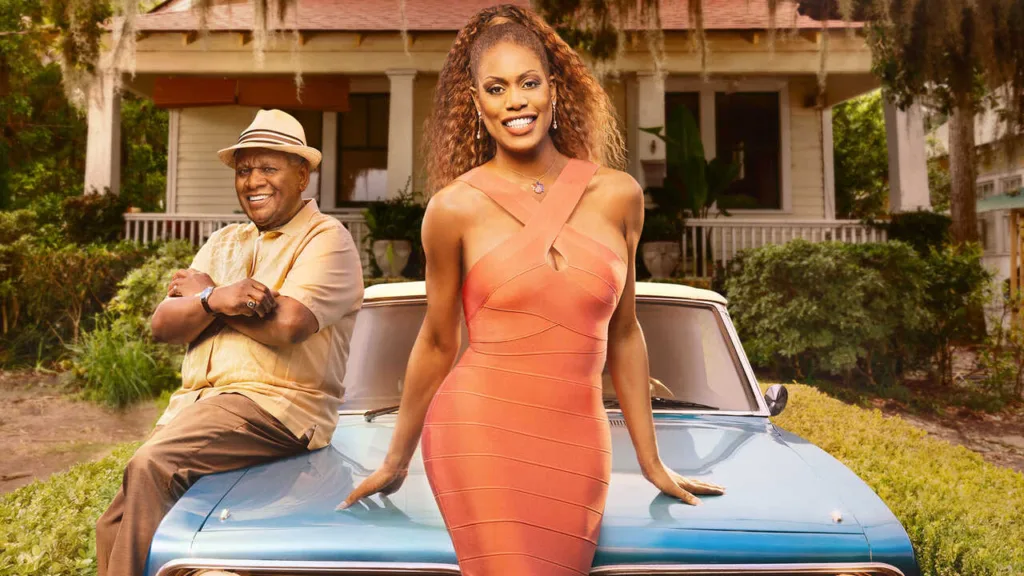Clean Slate emerges as a gentle comedy steeped in familial ties and contemporary social musings. In a nod to television heritage, the show carries echoes of a storied past, its connection to the legendary Norman Lear lending a subtle air of historic significance. One finds a graceful collision of traditional family values and modern societal discourses as Desiree Slate returns to her roots in Mobile, Alabama.
This reunion, centered around estranged bonds mended by time, unfolds amid a backdrop where cultural idiosyncrasies of the American South paint a vivid picture of a community steeped in both warmth and reserved tradition.
The narrative moves with a soft yet confident pace, opting for humor that gently dances around potentially contentious issues. The creative spirit of the project shines in its delicate approach to portraying change, presenting topics with a light touch that stirs empathy and thoughtful reflection.
Each scene exudes a careful calibration of affection and wit, inviting viewers to appreciate the transformative power of familial love in a setting that remains true to its regional roots. With an assured blend of soft humor and quietly persuasive storytelling, Clean Slate invites its audience to reconsider familiar narratives and reexamine the ties that bind without straying into overt sentimentality.
Reconfiguring Kinship and Storytelling
Clean Slate unfolds its narrative around the unexpected return of Desiree Slate after a 23-year absence. This homecoming unsettles a family expectation as Harry Slate, who had long anticipated the arrival of a son, is met with a transformed identity that defies long-held assumptions. The screenplay reorders familial roles with deliberate restraint, presenting a scenario where the redefinition of kinship emerges quietly through moments of subtle tension.
A tender romance unfolds between Desiree and Mack, a congenial car-wash employee whose understated interactions lend a nuanced layer to the unfolding drama. Their growing connection ripples through the community, hinting at the quiet potential of human ties to reshape societal norms. Simultaneously, secondary narratives involving neighborhood dynamics, minor health scares, and localized events enrich the narrative fabric, each subplot contributing distinct color and texture to the central theme of reunion and transformation.
The series adopts episodic vignettes that cumulatively construct a portrait of healing and restoration. Scenes staged around civic events, such as the charged atmosphere during Election Day, interlace with quieter moments of personal rediscovery, forming a rhythm that is both expansive and intimate.
The gentle humor inherent in everyday exchanges and small-scale conflicts drives the narrative forward, maintaining a steady pulse without resorting to heightened drama. Each narrative beat, whether focused on the reshaping of family bonds or the idiosyncrasies of communal life, presents a measured exploration of identity and expectation.
Quiet moments of dialogue reveal a deep commitment to reconfiguring traditional narratives, weaving together the intimate and the civic in a manner that is deliberate and unexpected. The integration of local cultural events, appearing as unassuming backdrops, lends authenticity to the portrayal of community life, while every interaction serves as a discreet nod to the evolving definition of family and belonging.
Embodied Kinship and Dynamic Portrayals
Clean Slate introduces two central figures whose lives are marked by transformation and quiet confrontation of cultural norms. Harry Slate appears as a stubborn yet caring patriarch, his rough exterior softened by moments of awkward adaptation. His occasional missteps—such as the unintended misgendering that punctuates his dialogue—reflect a clumsy but genuine effort to accept an evolving family identity. Every line he delivers hints at a man unprepared for the unexpected twist in his personal history, offering a study in the gradual reshaping of long-held beliefs.
Opposite him, Desiree Slate asserts a determined presence, channeling resilience with a dignified grace that underscores a journey toward self-affirmation. Her character reconciles the echoes of a storied past with the strength of a reimagined future. Through measured vulnerability and poised defiance, she stands as a symbol of personal transformation, inviting reflection on the complexities inherent in redefining oneself in familiar settings.
Supporting figures enrich this interplay of personal and familial renewal. Mack, an ex-con turned car-wash employee, infuses the narrative with a humor tempered by sincerity. His interactions provide a light counterbalance to the central tensions, while his daughter Opal contributes a refreshing buoyancy that bridges generational divides.
Characters such as Louis and Ella populate the community with a warmth that speaks to shared history and collective evolution. Their presence frames the personal dilemmas in a broader communal dialogue, where every interaction carries subtle implications about the nature of change.
The undeniable on-screen rapport between the principal actors infuses each scene with an authenticity that elevates the entire narrative. Their shared moments capture a spectrum of emotions, painting a picture of a community in transition—a living study of acceptance rendered with deliberate precision and a quiet intensity that challenges established notions of identity and belonging.
Reshaping Kinship and Societal Norms
Clean Slate unfolds its thematic layers through the gentle reconciliation of fractured family bonds. The series centers on the unexpected reunion of Desiree Slate with her long-estranged father, a scenario that upends established expectations and compels a quiet reordering of familial roles. The narrative reveals a steadfast devotion that replaces potential conflict with sincere, unguarded exchanges, offering a portrait of unconditional familial love that steadily softens hardened views.
Desiree’s portrayal as a trans woman radiates a precise and measured realism, casting her in a role that dispels outdated assumptions. Her presence affirms that daily existence holds both dignity and subtle complexity, inviting a reconsideration of established narratives surrounding identity. The depiction stands as a notable instance of trans representation, presenting a life that unfolds with thoughtful authenticity amid the everyday cadence of a supportive environment.
Mobile, Alabama, provides the stage for these unfolding dramas, its streets and local events reflecting a careful interplay between deep-rooted traditions and emerging progressive attitudes. Scenes set against community celebrations and charged political moments, including a memorable Election Day episode, bring into relief the tension between inherited customs and contemporary ideals. Such instances serve to punctuate the narrative with an observant critique of societal norms.
The script employs humor with a quiet, deliberate touch, diffusing delicate subject matter through understated wit and situational levity. Moments of levity interlace with emotionally charged encounters, promoting awareness and empathy while easing potential discord. Every humorous exchange functions as a subtle nod to the resilience found in a community committed to understanding and evolving, capturing a cultural moment where individual authenticity and shared values quietly coexist.
Refined Craft and Modern Sensibilities
Clean Slate employs a single-camera technique that distinguishes its visual narrative from the multi-camera approach often associated with conventional sitcoms. The portrayal of Mobile, Alabama unfolds in carefully composed frames that capture the essence of its streets and landmarks, imparting an air of quiet authenticity. The location work, modest yet effective, reveals local details that evoke the understated character of the setting.
The direction sustains a fluid balance, evoking nostalgia while engaging with contemporary storytelling. Scene transitions unfold with measured grace, each moment crafted to preserve a gentle pace that mirrors the unfolding familial drama.
Musical cues, notably the opening set to Stevie Wonder’s “For Once in My Life,” infuse the series with a mood that is both warm and evocative. The design of the Slate Family Car Wash contributes to a refined aesthetic, characterized by meticulous attention to detail and a subtle nod to classic Americana.
The absence of a laugh track, coupled with the deliberate use of a single-camera style, cultivates a viewing experience distinct from traditional sitcom formulas. This approach sharpens the focus on nuanced performances and intimate dialogue, crafting a visual and auditory environment where tradition converses with modern sensibilities, resulting in an atmosphere that is quietly reflective and decisively forward-thinking.
Comedic Craft and Narrative Wit
Clean Slate employs humor as an instrument of subtle subversion. The series leans on wry dialogue, absurd exchanges, and moments of physical comedy that extend beyond simple laughter. Sharp repartee punctuates scenes where characters trade barbs, revealing intricate layers of familial connection. One exchange at the family car wash, marked by a playful quip following an accidental misstep, encapsulates the show’s deft handling of identity and transformation.
Episodes unfurl in a structured manner, introducing minor conflicts that resolve through understated gestures of reconciliation. Recurring elements, such as a jar tracking verbal slip-ups, emerge as understated motifs that illuminate the narrative’s exploration of acceptance.
The humor remains calibrated, ensuring that levity does not undercut the emotional weight of the themes; instead, it offers glimpses into the characters’ inner worlds and communal ties. Character interactions drive the wit, with every joke arising naturally from the interplay of distinct personalities that span generations.
The dialogue unfolds with an organic ease, crafting a dynamic interplay where each humorous moment contributes a distinct brushstroke to a larger portrait of community and understanding. Here, humor functions as a gentle instrument, easing the delivery of significant social themes and painting a picture of quiet yet incisive cultural commentary.
Resonance in Modern Storytelling
Clean Slate radiates a collection of distinctive qualities that coalesce to create a warm, inviting experience marked by heartfelt storytelling, strong character dynamics, and subtle social commentary. The series channels a profound sense of familial reconciliation through its unguarded portrayal of love and acceptance, granting space for nuanced examinations of identity and belonging.
The depiction of trans identity, embodied by Desiree Slate, strikes a deliberate chord in today’s cultural landscape, challenging entrenched narratives while offering a balanced view of human complexity. Rooted in the personal rebirth of a long-separated family, the narrative expands into a wider cultural dialogue that enhances conversations surrounding inclusion and progressive values.
The delicate interplay of individual and communal transformation is rendered with precision, inviting audiences to engage with a text that contests traditional television storytelling frameworks.
Clean Slate claims a distinct position in the contemporary media scene with an originality that draws subtle connections to television legacies noted for their social awareness. The series hints at future possibilities where evolving story arcs and deepening examinations of social themes might continue to nurture a compassionate community and enduring connection among viewers, affirming its role as a quiet beacon in modern television.
The Review
Clean Slate
Clean Slate emerges as a gentle exploration of familial ties and evolving identity. Its careful storytelling, subtle humor, and sincere portrayals shape an engaging narrative that challenges outdated assumptions while offering a reflective take on inclusion and modern family dynamics. The series distinguishes itself with a measured approach and refined cultural commentary, presenting lighthearted moments alongside genuine emotional beats that craft an inviting, thoughtful atmosphere.
PROS
- Heartfelt storytelling with strong character arcs
- Thoughtful social commentary expressed through gentle humor
- Authentic portrayals of family reunion and personal transformation
- Convincing performances that enrich the narrative
CONS
- Occasional uneven pacing interrupting the flow
- Some dialogue moments that fall flat
- Production design that at times feels lackluster


















































